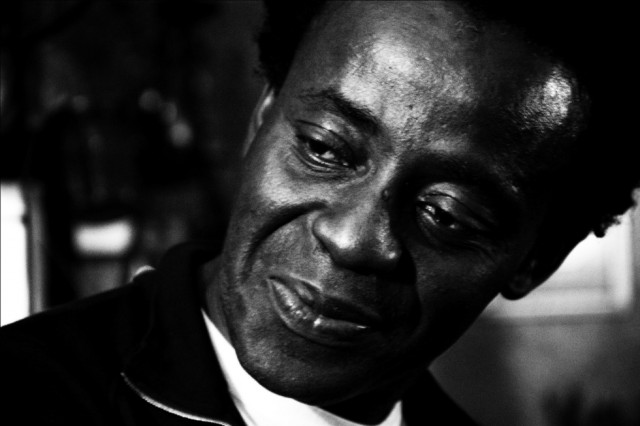In Profile: John Akomfrah
Heather Garner takes a closer look at the work of political ‘visual essayist’ John Akomfrah ahead of his Sheffield Doc/Fest 2015 retrospective, and finds that beauty can permeate the most difficult subject matter…
Filmmaker, activist, social commentator, writer, visual essayist… an artist of extraordinary thought and skill, London-based artist John Akomfrah has for 30 years tirelessly assembled narratives that seek to understand and make sense of the cultural and political constructs of race and identity that permeate the world we live in and, crucially, permeate his own life.
With such an extensive and rich career to draw from, it is no wonder (and surely about time) that Akomfrah’s work is the subject of a new retrospective as part of this year’s Sheffield Doc/Fest, featuring four of his most cutting and experimental creations.
As a Ghana-born British Citizen, Akomfrah found his artistic voice in 1982 with the formation of the Black Audio Film Collective – a collaborative project between university friends Akomfrah, Reece Auguiste, Edward George, Lina Gopaul, Avril Johnson, David Lawson and Trevor Mathison. With the shared and deeply personal subject matter of multiculturalism to draw from, the collective approached filmmaking as a means to document and contemplate Black British identity, and in doing so, reaffirmed their own.
Film number one at Sheffield Doc/Fest and Akomfrah’s directorial debut, Handsworth Songs, epitomises the essayist quality that has come to characterise much of Akomfrah’s oeuvre. Created in the aftermath of the infamous Handsworth Riot of 1985 – initially sparked by a minor driving incident, yet escalated due to racial discrimination and catastrophic social deprivation – Akomfrah utilised newsreels, photographs and music to shed light on the events that took place. Not from the authoritative voice of the newsreader, but from the subjective and inquisitive view of the artist.

The Handsworth Riots perhaps hit closer to home on a social level, but in 1963 the events of the civil rights movement held resounding effects throughout the world. In Akomfrah’s 2013 film, The March, Martin Luther King’s historic ‘I have a dream’ speech and the march on Washington DC are remembered. In the years that have passed since this historic event took place, it is hard to imagine how it could be seen anew, but Akomfrah harnesses unseen archival footage and interviews from ordinary citizens who took part on that day.
While The March provides a more internationally revered and iconic event to ponder, Akomfrah’s most eminent visual essay comes from the emergence of the New Left in the form of The Stuart Hall Project. Compiled from over 100 hours of archival material, cultural theorist and sociologist Hall’s push for equality of marginalised populations through race, gender and class had a profound effect of Akomfrah, and provided a platform for all kinds of ‘impossible possibilities’ in an era of discrimination.
Despite the heavy political and social commentary that is central to such filmic compositions, the literary and even poetic sensibilities of Akomfrah always shines through. Take his 2013 creation, The Nine Muses: combining the visually stunning landscapes of Alaska with images from the archive of black and Asian people in Britain, a solitary figure stands isolated amongst a vast and mysterious landscape. Such powerful imagery as this demonstrates cultural and post-colonial contemplations, but perhaps what remains most powerful of all is Akomfrah’s examination of ancient and mythic storytelling techniques, reminiscent of Homer’s Odyssey. It is here that the romanticism of the landscape is brought to the fore, demonstrating that beauty can permeate the most difficult subject matter.
Akomfrah is unquestionably a powerful force in the discussion surrounding race and identity, but perhaps what pervades his work more than anything is his relentless curiosity and desire to understand. It is this that brings us back to the title of essayist; not in the sense of writing but as Akomfrah states, ‘as a way to make sense of things’. Sheffield Doc/Fest’s retrospective is a perfect chance to understand his far reaching and diverse body of work.
Heather Garner
See the John Akomfrah Retrospective at Sheffield Doc/Fest from 5-10 June 2015 at venues across Sheffield
See John Akomfrah in conversation tomorrow, 4.30pm, 6 June 2015 at the Crucible Studio, Sheffield — £8. Single tickets are available for all special events at Sheffield Doc/Fest — priced from £6
See here for all tickets – full festival pass (inc festival, conference and videoteque) £418.80; day passes £180; UK virtual delegate £118.80





